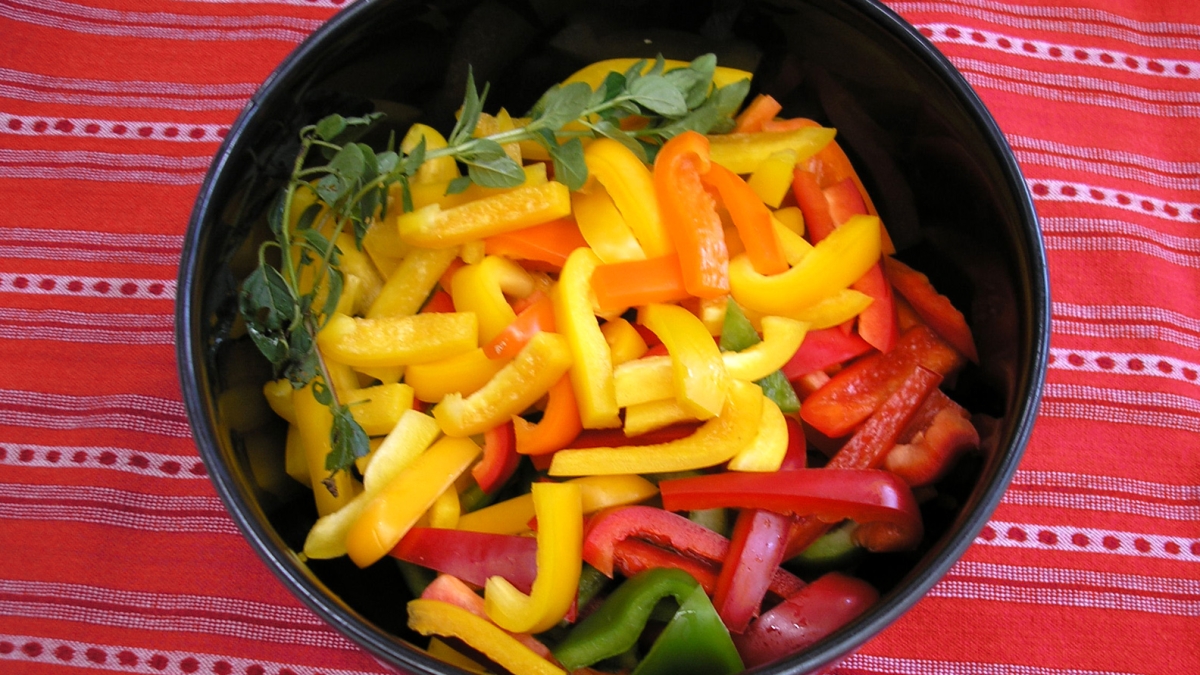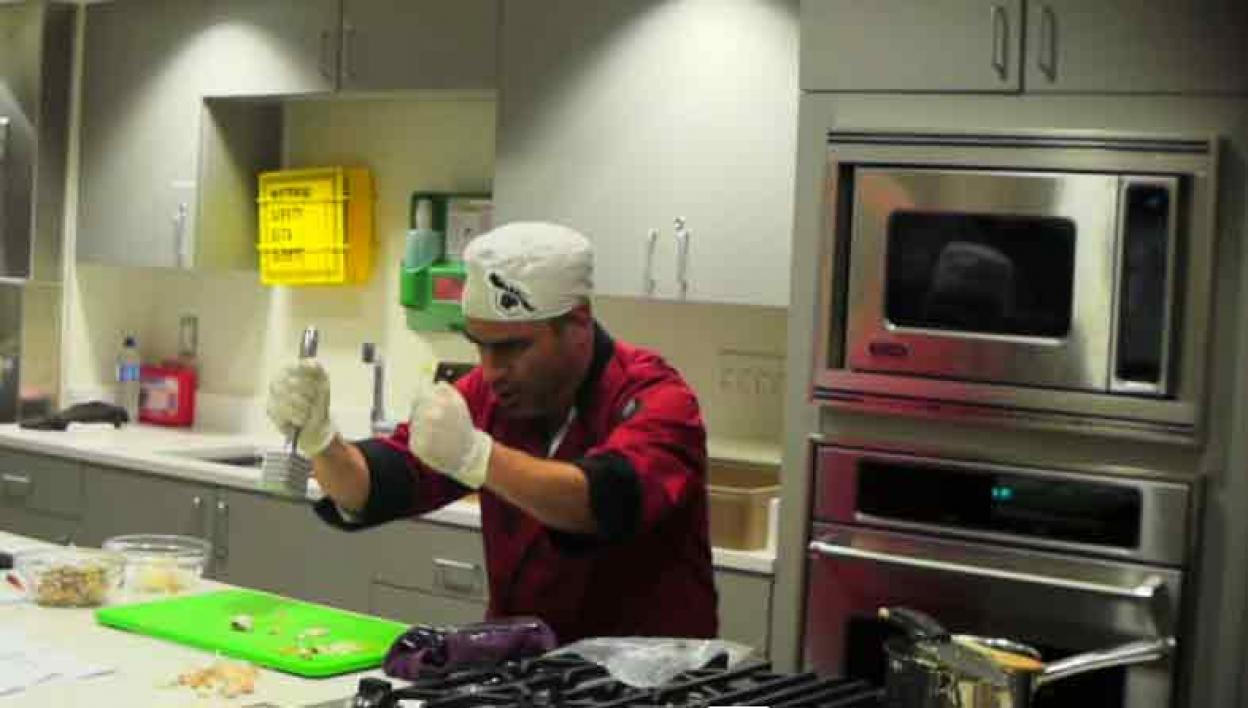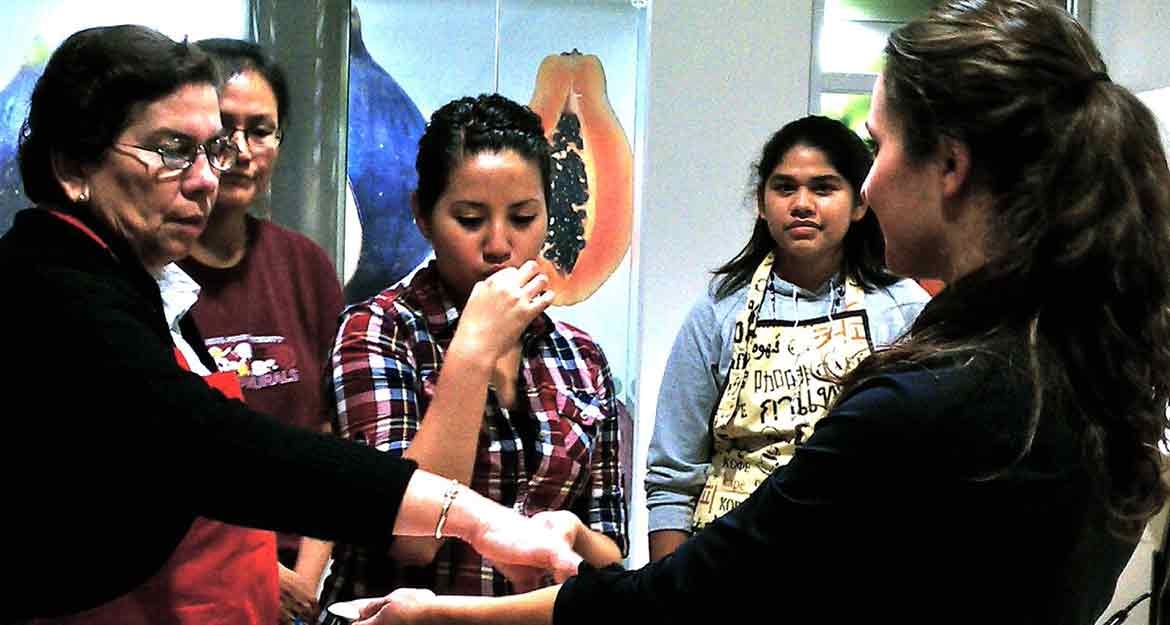In ASU’s teaching kitchens in downtown Phoenix, the din of cooking activity is peppered with the sounds of friendly conversation.
Just an hour ago, the white-aproned amateur chefs knew each other only casually. Now they are cooking shoulder-to-shoulder and sharing stories inspired by the food, such as eating nopalesNopal is a common name in Mexican Spanish for Opuntia cacti, as well as for its pads. and making tortillas with their grandmothers. They also discuss their roles in the cooking show they will record. As the group cooks, shares and later crafts a theater piece together, they are also promoting behavior that will help prevent type 2 diabetes.
A tall white chef’s hat bobs energetically about the room as the lead chef demonstrates tortilla-making techniques or asks someone to elaborate on a meal or recipe they remember. The man beneath the hat calls himself Mero Cocinero, the People’s Cook. Periodically he gestures broadly with a wooden cooking spoon or praises the participants in a booming voice.
The role of Mero Cocinero is played by Robert Karimi, a chef and performance artist. He joined faculty from ASU’s School of Film, Dance and Theatre and the School of Transborder Studies to create Cultural Engagements in Nutrition, Arts and Sciences (CENAS, which is the Spanish word for “dinners”). CENAS combines theater-making and cooking to promote behavior changes linked to healthy eating and type 2 diabetes prevention in populations at risk for the disease. At the same time, the program honors the cultural food pathways each participant brings to the table.
That theater-making can take the form of role-playing, but sometimes includes actually filming a cooking show. It's not just cooking, but a cooking experience, organizers said.
Tamara Underiner is associate dean for research in ASU’s Herberger Institute of Design and the Arts. She leads CENAS with colleagues Seline Szkupinski-Quiroga, faculty research affiliate with the Southwest Interdisciplinary Research Center; and Stephani Etheridge Woodson, associate professor in the School of Film, Dance and Theatre. The research is supported by the National Endowment for the Arts and by ASU’s Institute for Humanities Research.
The team designed the research methods and cooking curriculum for CENAS to evaluate the impact of a series of lively, immersive cooking experiences on the attitudes and behavior of participants. Over a three-week period, students, community leaders and professionals in south Phoenix donned aprons and began to mix, mince and marinate under the direction of Mero Cocinero.
Mero Cocinero enthusiastically guided participants to put on cooking shows, role-play as farmers or chefs or learn a new skill in the kitchen. With encouragement from Karimi and trained ASU students, participants shared stories about the recipes their grandmothers made, favorite holiday foods and memories of a childhood garden.
“Making theater together, honoring the stories your grandmother told while she was cooking the beans over the cookstove, those are the kinds of things that help people move to a position of strength to honor who they are and where they came from and to continue to cook together for the whole family's benefit,” said Underiner.
The CENAS team introduced ways to incorporate traditional foods into meals using the American Diabetes Association’s “plate method” of eating, which recommends filling half a plate with vegetables, one-quarter with starches and one-quarter with protein. Karimi emphasizes that eating culturally important foods is not inherently unhealthy, contradicting a message that some of the participants unfortunately have received, even from medical doctors. Instead, he explains, returning to the recipes and foods cooked by older generations and based in ethnic cuisine can be both healthy and empowering.
“This is the place to do this kind of work. If you have a good idea you can do it here.”
— Tamara Underiner, associate dean for research in ASU’s Herberger Institute of Design and the Art
“Food is the beginning, not the end. Food is both educational and is bringing the community together through food culture and joy,” said Karimi.
After the cooking experiences, participants reported eating more fruits and vegetables and having a more open attitude towards healthy eating. Importantly, participants also reported viewing healthy eating as a practice they could embrace and one that made them feel empowered.
Quantifying the effects of theater-making on behavior change and healthy eating is novel in the field of medicine. The results of this study are now being used to design broader intervention research that will comply with National Institutes of Health standards.
Karimi likens ASU’s transdisciplinary culture to the comedy improvisation rule of “yes, and,” which commands actors to consider unexpected outcomes and to collaborate with other performers.
The CENAS project would not be possible anywhere but ASU, said Underiner, because of the “yes, and” willingness of faculty to collaborate across academic disciplines and the support from university leadership to try something new.
“This is the place to do this kind of work,” said Underiner. “If you have a good idea you can do it here.”
Top photo by Lyn Belisle/Freeimages.com
More Health and medicine

Reducing waste in medical settings
Health care saves lives, but at what cost? Current health care practices might be creating a large carbon footprint, according to ASU Online student Dr. Michele Domico, who says a healthier…

ASU offers bilingual counseling to Spanish speakers
Arizona is one of the five states in the nation with the highest percentage of Hispanic residents, according to the U.S. Department of Health and Human Services Office of Minority Health, and …

College of Health Solutions launches first-of-its-kind diagnostics industry partnership to train the workforce of tomorrow
From 2007 to 2022, cytotechnology certification examinees diminished from 246 to 109 per year. With only 19 programs in the United States, the cytology workforce that stands at the front line of…




